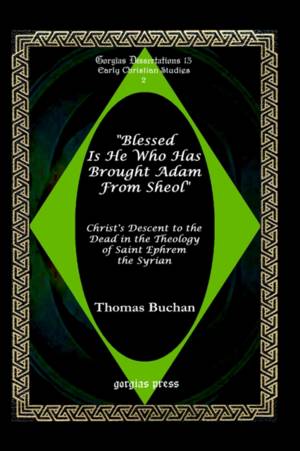
- Retrait gratuit dans votre magasin Club
- 7.000.000 titres dans notre catalogue
- Payer en toute sécurité
- Toujours un magasin près de chez vous
- Retrait gratuit dans votre magasin Club
- 7.000.0000 titres dans notre catalogue
- Payer en toute sécurité
- Toujours un magasin près de chez vous
Blessed Is He Who Has Brought Adam from Sheol
Christ's Descent to the Dead in the Theology of Saint Ephrem the Syrian
Thomas Buchan
213,45 €
+ 426 points
Description
"Blessed is He who has brought Adam from Sheol" Christ's descent to the dead in the Theology of Saint Ephrem the Syrian is an examination of the theological use of the doctrine of Christ's descent to the dead in the works of Saint Ephrem the Syrian (ca. 306-373 C.E.). In the ancient Christian church, it was believed, taught, and confessed that in the interval between his crucifixion and resurrection, Jesus Christ descended to the abode of the dead. Christ's descent to the underworld was nowhere earlier, more elaborately, or more influentially expressed than within cultural milieu of Syriac Christianity, where the underworld was designated not as Hades or Inferos, but as Sheol, and it was nowhere within this milieu more frequently, effectively, and influentially implemented than in the writings of Ephrem the Syrian. Organically integrated with and providing an integrating function within his theological reflection as a whole, Ephrem's conception of Christ's descent to Sheol provides us with an important and distinctive vision of the significance of this salvific event. Ephrem's use Semitic and non-Western poetic forms and structures as a mode of theological discourse, coupled with his preference for imagery and symbolism rather than definition, resulted in a variety of vivid depictions of Christ's descent to Sheol. Especially informed by Ephrem's view of the redemptive and revelatory significance of Christ's incarnation, these 'verbal icons' imaginatively collapsed distinctions between temporality and eternity and creatively drew together cosmological, incarnational, soteriological, ecclesiological, sacramental, and eschatological themes in the context of Christian worship. Thomas Buchan is an editor for Gorgias Press in Piscataway, New Jersey and adjunct professor of Church History at Drew University in Madison, New Jersey (Fall 2004). Born in Rahway, New Jersey in 1972, he earned a B.A. in Biblical Studies at Wheaton College (Wheaton, Illinois) and an M.A. in Church History at the Wheaton Graduate School (Wheaton, Illinois). Dr. Buchan studied the history and theology of early Christianity at the Caspersen School of Graduate Studies at Drew University, earning the M.Phil. in 1999 and completing the Ph.D. "with distinction" in 2003.
Spécifications
Parties prenantes
- Auteur(s) :
- Editeur:
Contenu
- Nombre de pages :
- 412
- Langue:
- Anglais
- Collection :
Caractéristiques
- EAN:
- 9781593332280
- Date de parution :
- 17-12-04
- Format:
- Livre relié
- Format numérique:
- Genaaid
- Dimensions :
- 152 mm x 229 mm
- Poids :
- 771 g

Les avis
Nous publions uniquement les avis qui respectent les conditions requises. Consultez nos conditions pour les avis.






